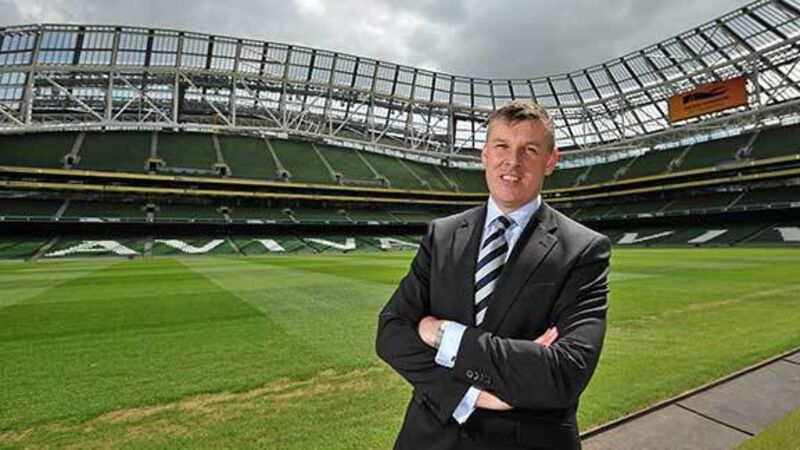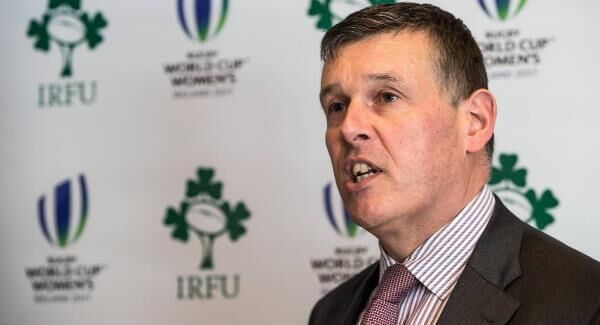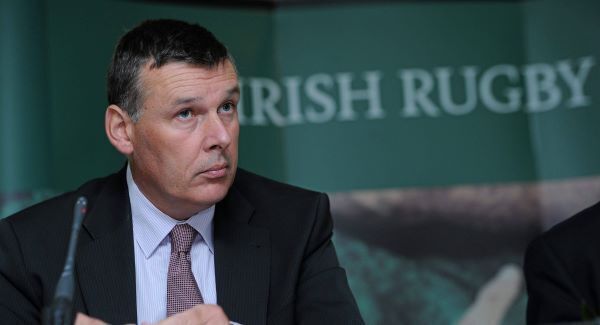Philip Browne Interview: Trying to spread the jam evenly

HILIP BROWNE doesn’t need enhanced acoustics in his second floor office on Lansdowne Road to catch the mood at the Aviva Stadium. But if Ireland come up short against Italy in the Six Nations this afternoon, the downdraught will sweep up from the ground and in his door.
If projections aren’t everything to the chief executive of the Irish Rugby Football Union, they’ll do until everything arrives. Ticket projections. Provincial projections. World Cup bid projections. Winning projections.
“For our budgets, we project to come fourth in the Six Nations, so anything better than that keeps us ahead. Each country gets merit-based payments, depending on where you finish. When you get up towards the top end of (the table), you are talking about a couple of million. Winning the Championship is worth a serious seven figure sum.” As in around €2m.
The Union’s conservative projection has proved unfortunately accurate this year, with England, Wales and France looking down on Joe Schmidt’s Ireland ahead of the penultimate round of the championship. Winning the last two games at home to Italy and Scotland may get Ireland no higher than fourth. Allied to a bad season for our provinces in Europe...
“A bad year for the clubs in Europe won’t directly impact the IRFU, but obviously down the track may do if they don’t financially make ends meet. We are the lender of last resort,” Browne underlines.
And the provinces cost a lot. It’s a testy issue outside the cushioned seats of Leinster, where the population centre and corporate income greases the wheels of the provincial and club game. When there’s mouths to feed, things can get prickly.
Browne tacitly acknowledges the likes of Munster and Connacht — and to a lesser extent Ulster — are not operating on the same above-water playing field as Leinster these days. However, further interrogation of the issue provides no indication this will be rectified by artificial intervention in the short term. The need for balance — remembering the provinces are in competition — is fundamental, he indicates.
“There is an issue, of course, with the relative commercial strengths of the provinces,” he says. “Leinster has 50% of the overall and the rugby population. Munster, a big area but smaller in rugby population, has about 20%, Connacht 10% and Ulster another 20%. How do you marry all of this up together?
“The great danger is that we spread the jam too thin, in which case the tide lowers for everyone. Everything can’t just be focused here in Leinster, but in the current economic climate, it is becoming tricky. Also, the provinces are running the amateur game - you aren’t comparing apples with apples when people start equating the provinces to the French Top 14 clubs.
“You’ve got clubs in France with budgets of €30 million, while we have a total budget for Rugby in this country of €110 million. We have to run the professional and the amateur game, and there are a lot of mouths to feed — all of whom are feeling the pinch. It is tricky. We put money in to each province in terms of players and technical staff. The Union is putting in at least 50% in terms of turnover into each of the provinces.”
He puts the pudding on the table for slicing. “Let’s say a province is spending around €12m per annum. It’s P&L (profit and loss) comes from gates of, say €6-7m, there’s expenditure of around €12m which requires a subsidy from the IRFU of around €6-7m. They are rough figures, but we are subsiding the provinces to that tune each year.
“Obviously Leinster has greater earning potential to recoup its spend than the others. The difficulty Munster, for example, now have, is that they don’t have the ability to raise money around attendances to the same extent now. The economy in Munster was badly impacted over the last decade. The revenues generated in Leinster and Ulster...there is a gap, so when it comes to financing players....
“Then you ask the question: ‘Is the Academy system in Munster as effective as it should be?’ The same issue is relevant for all four provinces.”
With so many units tugging at it, Lansdowne Road cops flak for many things. When it goes down with a cold, the provinces hunker down. If only the Union would open the door to private investment, to a benefactor. It’s really that easy?
“There would be no problem. We have an open mind in relation to any proposition. There is no issue there.”
In fact, there is.
“The issue is, what are they going to get in return,” Browne shrugs. “The shareholders in each branch are the clubs, that’s the way it is. In France, someone comes in and buys the club — as in the players, the brand, the physical facilities, the whole shooting match. Gloucester, for instance, has just been sold by the Walkinshaws for around £12m, and a new owner, Martin St Quinton, has bought the controlling shares.
“Now compare that to Munster: Thomond Park is owned by the clubs and by the branch. You can’t sell that. The players are owned and controlled by the IRFU, the revenue streams aren’t sufficient to cover the costs of running the professional game — so whoever is going to invest in professional rugby in Ireland is essentially writing cheques for €1m and continue doing that until they get bored.
“What happens then? You have to find someone else to write the cheque. How many such folk are out there with that level of discretionary income, who are prepared to simply be a sugar daddy. Therein lies the difficulty. The Walkinshaw family could either have sold Gloucester as a going concern (which they did) or just sell the place and build houses.
“Whatever investment is made in Ireland, it can’t be secured against anything. Give them a seat on the Board? If someone gave €5m, are they going to give it next year? So they go out and buy a clatter of good players. What about the contracts in 2017?. Also there is the issue of selling off the playing assets of the professional game here. What would finance the club and schools game in that case?”

Of course, there is private money being invested in the game here. Business man David Shubotham helped build Leinster’s training centre at UCD, but if it’s an ownership thing, it’s either a million into the yacht in the Med or a million into the rugby club down the road.
“The shareholders in each branch are the clubs, that’s the way it is,” the CEO explains in a way that indicates it’s not the first time this proposition has been lobbed in from the cheap seats. Another such is contracts and the sword of Damocles that is the daily (newspaper-ventilated) threat export of Ireland’s brightest talent.
“It’s not a science, even though it’s great entertainment for the media,” he smiles. “There are three parties to every contract — us, the agent and the player. In an ideal world, it would all run smoothly. There is no particular formula for making it happen. What we try to do is engage as early as we can - we might engage a year ahead for certain players but there are circumstances where it doesn’t suit the players to engage with us (a dip in form, for instance). For other players, injured ones and the like, you have to wait. Then others might emerge that you have to deal with.
“This season we couldn’t start contracts talks with the players until after the World Cup, for obvious reasons. So effectively from July through to October last year, they were tied up.
“Let’s say, there’s a turnover of six contracts a year, we’d be happy we have dealt with them as best we can. At times you have to introduce a dose of reality to a conversation as well. Players may go abroad for a number of reasons - 1) if they find they are not getting sufficient rugby (Ian Madigan), 2) some go for money and that’s their prerogative. We do our best,” says Philip Browne, “If we can keep the majority of the national team here, that’s what we are going to try and do.”
80% of the revenue generated by the IRFU comes on the back of the national team. The provinces and clubs reluctantly agree with the hierarchy of country, province, club.
“The key is finding a workable balance between the aspirations of the national team and the provinces,” Browne underlines. “That becomes difficult in a situation where we have four professional clubs and our national team is drawn from one or two provinces to a greater extent than the other two. In England or France, you are talking about the national team being drawn from 12 or 14 clubs.
“So the impact of the national team on Leinster, for example, is significant, particularly when you add the Ireland Under 20’s being cherry-picked around the same time. In the past Munster were in that situation and it may be Ulster in the future. It goes around.
“The biggest issue, therefore, is to have a body of players, and a depth of players that allows us to continue to be successful at provincial as well as national level. The reality is if succession isn’t sorted out and we don’t have depth at provincial level, we are not going to have it at national level.”
Which is where David Nucifora, the IRFU’s Performance Director, comes in.
“He must make sure we have the best possible pathway to produce better players, quicker than we have been. This notion that Irish players don’t mature until their mid-20’s...I have never heard such rubbish,” Browne argues. “The reason we are behind the other nations in terms of physical conditioning and skills is because we are not actually getting to the players with the right technical coaching and skills development early enough. We have to respect the pathways there in terms of clubs and schools, but we have to be conscious that when they do get into the academies, they are more ready for it.”
The Union’s relationship with the Schools system has often been described as icy. Where Lansdowne Road requires earlier intervention, the schools put up the shutters at the prospect of their competitions being compromised.
“David’s view is the High Performance system doesn’t engage early enough with players. The two have to work together, there have been meetings with the schools. Everyone must understand what we are trying to achieve here, which is not to denigrate the schools system, but work with them for the benefit of the kids. The fundamental issue is twofold,” he adds. “One is to provide the supports around players at a younger age that allows them understand where they are in the pathway and how they can develop along it. Secondly make that pathway relevant to the professional game. It’s about giving everyone - schools included - the clarity about where they fit.”
And the clubs? The runt of the litter? “There is a disjoint or fractured line between the clubs and the professional game. Some clubs would be of the view that they don’t want the professional players playing in the club system, because it distorts it. Others say they would really like to be playing at the top level with some of their pro players. But then you have the professional game and the academy system saying ‘the best coaching they are going to get is in the professional environment’.
“Neither are right or wrong. But can we find a solution that allows you to stitch up that interface between both.”

HERE bidding for the 2023 Rugby World Cup comes in the hierarchy of priorities for Lansdowne Road is a debate in itself, but it’s a pitch that unspools rapidly and embarrassingly if not whole-heartedly engaged with. Street wisdom says South Africa is favourite on the principle of ‘your turn’. The southern hemisphere won’t have hosted an RWC since 2011. However the IRFU CEO and his Board has put together an aggressive and savvy bid team. Unturned stones won’t be a problem.
“It’s still way too early to judge where we are in the pecking order. South Africa and France — who have both run RWC’s and Soccer World Cups, and Italy, which has hosted Soccer World Cups and European Championships, are there, so we are up against it.
“But the advantage of being a small country is that we can really make things happen if we work hard at it. The most encouraging thing is both Governments, north and south, have fully embraced the project. There is no divisive elements at play at all. Completely the opposite in fact.
“World Rugby look for a legacy, both for the sport and the country: Is there a compelling merit behind your bid? We’ve got a very good team, run by Kevin Potts here at the IRFU (project manager). We have Deloitte Sport UK, would have been involved in a number of successful bids, including the 2012 Olympics and the consultancy involved in the last three successful Olympic bids. We’ve as good a team as we could have.
“This is being done in a very serious manner. We are well placed, therefore, to put a good bid together.”
The Bid documentation process will be issued by RWC in May. Strictly speaking, the Union doesn’t yet know the final criteria, but they have more than a fair idea. At this stage, it’s down to the bed linen. A pre-qualification phase of basic criteria will be dealt with by the autumn and the full bid has to be submitted by May 2017. World Rugby make their decision by September-October of next year.
“So it’s not that far away,” he says.
Sepp’s shenanigans in FIFA issues has raised the bar of the process in terms of transparency and open dialogue. “From our point of view, we have to be able to show to the rugby community 1) we have the stadia, 2) the physical infrastructure to get people around the country.
“Most people going to a rugby match are coming to Dublin and that it is two hours from Cork, Limerick, Galway and Belfast by motorway, and there is ferry ports in Dublin, Belfast, Rosslare, Cork as well as airports all over the country. The Government are making a financial commitment, but the reality is that it is still going to cost the IRFU a seven-figure sum, even if we are unsuccessful. It’s an opportunity we either grasp or we let it go. It provides an opportunity to showcase the game. We will need around 40 training grounds so that will create an opportunity for investment in the club game in terms of upgrading.
“From a national perspective, across the island, it’s potentially a game-changer in terms of portraying around the world what Ireland in the 21st century is about. That opportunity? You just couldn’t buy it. And then there is extremely significant tourism benefits. We are talking about 400,000 people coming into the country.”
To that end, next year’s Women’s World Cup in Ireland is being seen, and used, as a dry run. “We have made a big commitment to that. It’s a great showcase for the women’s game. We will be under some scrutiny from World Rugby. We may not win the 2023 World Cup next year, but we could lose it. We have a full time project manager and that’s his sole job.
“You apply to host the World Cup, you are looking at legacies, and we will full engagement from every stakeholder, including the public and the supporters. What does it leave rugby as a sport? And what does it do for the the country. It is, in many ways, a no-brainer.”












